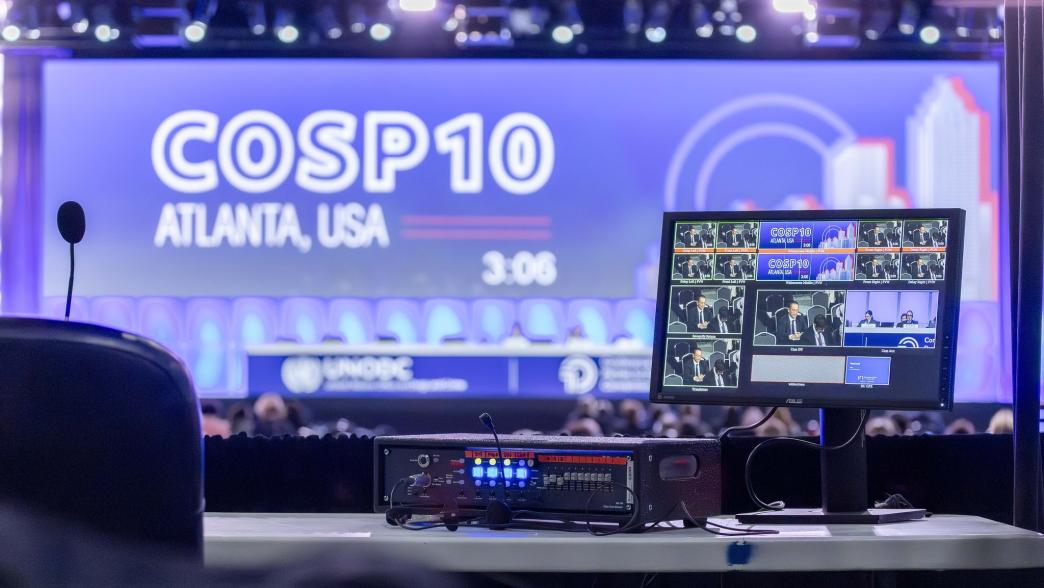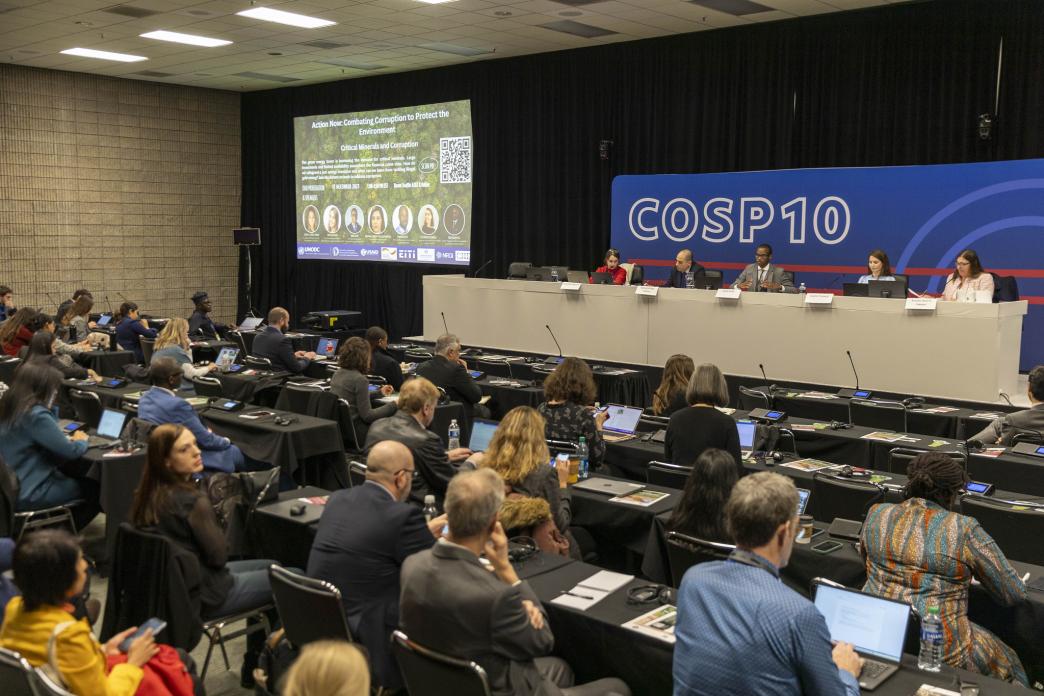
On the CoSP of Change: UN Conference Frames Extractive Sector Anticorruption Challenges
While UN watchers were glued to coverage of the COP28 climate conference, another important meeting in the resource governance space took place last week: the 10th United Nations Convention Against Corruption (UNCAC) Conference of States Parties (CoSP10). NRGI colleagues tread the carpeted halls of the Georgia World Conference Center in Atlanta, U.S., arguing that UNCAC, the only legally binding universal anticorruption instrument, should contain stronger measures to address corruption in the extractive sector. Here we share three key takeaways:
Support for civic space and participation is as important as ever, but faces headwinds
For a large and often technocratic diplomatic meeting, we were heartened by such a strong turnout from other civil society organizations (CSOs). CSOs made our voices heard, whether through special events on the side of negotiations or through representatives embedded in country’s delegations, with much of this possible thanks to the diligent organizing of the UNCAC Coalition.
Yet this hasn’t been smooth sailing for all, with the conference kicking off on a discordant note. Azerbaijan had objected to the participation of five CSOs but, in an unprecedented vote, its objection was overruled, allowing all registered CSOs to participate in the CoSP. This vote came the day after Azerbaijan was announced as the host of next year’s COP29, setting a worrying precedent for the world’s largest climate gathering. For the third year running, COP will be hosted by a fossil fuel-producing country with limited civic space and a poor human rights record. (Egypt hosted in 2022, and this year’s COP was in the United Arab Emirates.)
Local monitors indicate that Azerbaijan has jailed 19 civil society actors in just the last two months, adding to the list of over 200 members of civil society currently imprisoned in the country. This includes former Extractive Industries Transparency Initiative board member Gubad Ibadoglu, whom NRGI and partners continue to call upon Azerbaijani authorities to immediately release.
Crackdowns like these stifle public debate and serve as a stark reminder that—whether the topic is corruption or climate—international bodies like the UN and national governments must protect civic space to enable accountability and equitable engagement. This includes freedoms of expression, association and assembly, and the right to public participation.
Growing recognition harms caused by mining sector corruption
In Atlanta NRGI participated in a well-attended special event exploring corruption in the mining sector, part of a bumper half day program on environmental corruption, alongside representatives from the government of Peru, GIZ, USAID and EITI. We highlighted the launch of new resources in our corruption diagnostic tool, which includes new guidance on pressing corruption topics such as artisanal and small mining, the intersection with environmental and human rights abuse, and fossil fuel phaseout, alongside an updated methodology based on feedback from users of the tool in five countries.
At CoSP10, we were able to highlight one such use: a diagnostic process into corruption risks in Guinea’s bauxite sector. This endeavor resulted in the release of an in-depth report and action plan identifying significant corruption issues, serving as a tangible example of the ways in which NRGI’s tool can help anticorruption actors to move beyond theoretical concepts to real-life action. Read more about this work, and hear a summary from NRGI’s Mohamed Cisse in the video below, filmed for CoSP10.
Interventions from both the panelists and the audience showed that there is important work underway on this topic, but that more could be done to ensure that producer countries get a fair deal and that groups working on human rights, environmental protection, and anticorruption are better coordinated.
Greater coordination between climate and anticorruption efforts to address environmental crime and corruption
The UNCAC Coalition’s Environmental Crime and Corruption Working Group, of which NRGI is a member, raised the issue of environmental crime and corruption in negotiations. Corruption harms both people and the planet, through direct impacts on communities and nature and by undermining a just energy transition. Ahead of the CoSP, over 300 organizations signed an open letter to CoSP10 delegates calling for a resolution on this topic, including on the need to strengthen transparency, integrity and accountability around licenses and contracts in the extractive sector.
Despite clear support for this issue, there was to be no specific resolution on this topic and efforts to raise it in other resolutions on private sector initiatives and small states were also fruitless. At the final hurdle, a reference to environmental crime and corruption was also removed from the U.S.-led Atlanta Declaration on accountability, which was agreed in a deeply fraught process lasting into the small hours. This disappointing outcome is a step back from previous CoSPs and out of step with tentative transition-related advances made at COP28, underscoring the need for the UN and other international bodies to strengthen coordination between anticorruption and climate efforts.
Looking forward, climate and environmental forums like the UN Framework Convention on Climate Change, Intergovernmental Panel on Climate Change, and UN Environment Programme should acknowledge that extractive sector corruption is an obstacle to effectively and equitably addressing climate change and achieving a just energy transition, and dedicate resources to tackling these interconnected issues. The IMF-hosted COP28 panel on addressing governance and corruption challenges in the response to climate change, which NRGI moderated, was a step in the right direction.
CoSP was a harsh reminder of how far some states will go to block progress, but a great opportunity to witness firsthand how many others are striving for change. In 2024 we will continue our work on topics old and new, such as how the energy transition is impacting corruption risks in licensing and contracting, and the intersection between corruption and environmental and human rights harms. And, after a week alongside inspiring advocates, we’re assured that we’ll find much-needed allies for these efforts across the anticorruption movement.
Authors

Susannah Fitzgerald
Governance Officer

Erica Westenberg
Governance Programs Director

Mohamed Cisse
Guinea Program Associate

